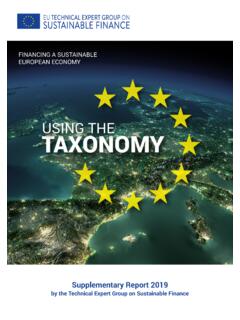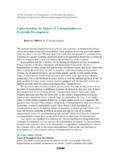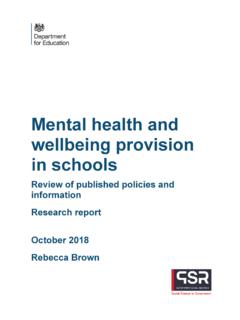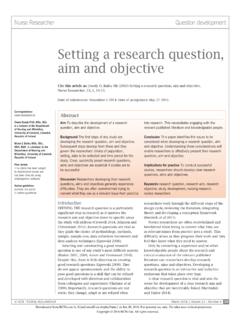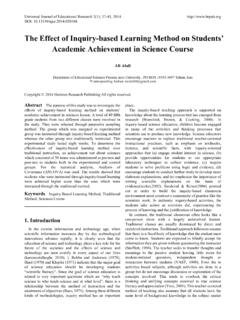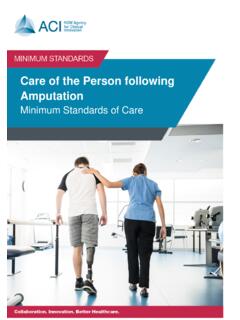Transcription of A Report on the Interpersonal Communication Skills of ...
1 A Report on the Interpersonal Communication Skills of Listening, Questioning and Feedback Related to Laboratory Technicians By Mitchell Westlake for COR109: Communication and Thought Executive Summary The purpose of this Report was to highlight the benefits and challenges of listening, questioning and feedback for laboratory technicians. This Report has been limited to listening, questioning and feedback in laboratory settings for laboratory technicians and through analysis of academic literature. A high percentage of time was spent in discussions with other staff about how to effectively carry out tasks and the more an individual was engaged the more likely they were one of the more qualified members. Encouraging the questioning of results produced a more diverse range of results which is an associated trait of intuitive personality types.
2 This type proved to be curious and sought to challenge others ultimately leading to higher growth overall. Trust, developed from feedback, forged a willingness to work together and encourage safe environments to learn and work resulting in developing new knowledge and positive outcomes. The training programs may undervalue Interpersonal skill and produce ineffective technicians, while inappropriate Communication techniques used in the industry must be managed to garner positive responses from other staff. The timeline of the project impacts on feedback effectiveness. The Report recommends distinguishing between personality types to yield more specialised technicians, to design laboratory programs based around thinking patterns, encourage specific and systematic clarification in undertaking tasks, the use of appropriate methods of Communication in regards to formal and informal requests between intermediary bodies, the encouragement of technicians to work collaboratively and to develop mentorship programs for new technicians.
3 I 1 INTRODUCTION 1. Authorisation and purpose 1. Limitations 1. Scope 1. Methodology 1. 2 LISTENING 1. The skill of listening 1. The benefits of listening in a laboratory setting 1. 3 QUESTIONING 2. The skill of questioning 2. The benefits of questioning in a laboratory setting 2. 4 FEEDBACK 3. The skill of feedback 3. The benefits of feedback in a laboratory setting 3. 5 CHALLENGES 3. 6 CONCLUSION TO INCORPORATION INTO LABORATORY SETTING 4. 7 RECOMMENDATIONS 4. REFERENCES 5. ii 1 Introduction Authorisation and purpose This Report is authorised by Dr Gregory Nash, CEO Labtech Industries, Queensland. The purpose of this Report is to fulfil the Report writing task for COR 109 Communication and Thought, at the University of the Sunshine Coast, Queensland, Australia. Limitations This Report is limited to listening, questioning and feedback in laboratory settings for laboratory technicians.
4 Scope This Report focuses on the Interpersonal Communication Skills of listening, questioning and feedback related to laboratory technicians. Communication theory and journal articles are utilised to illustrate the benefits and challenges of Communication Skills for Laboratory technicians. Secondary and tertiary sources have attributed to outline the theory and provide evidence to support findings. Recommendations about how to achieve improved Communication are provided. Methodology To complete this Report research into journal articles involving the varied fields incorporating laboratory technicians and the analysis of literature surrounding Communication theory at a university level was done. 2 Listening The skill of listening Communication requires listening conscientiously and is applicable to laboratory settings, which is why understanding its importance has relevance to technicians and their colleagues.
5 Listening requires the deliberate interpretation of both audial and visual stimuli in order to gain a clarification of an idea communicated from an external source (Eunson 2013). By paying credence to alternate points of view and valuing the input; a full picture can be established and they will feel more respected in return (Eunson 2013). Additionally, listening requires more than merely gathering facts, but picking up on emotions which can dictate the meaning of a message. Organisations therefore require technicians to listen to patients and consultants so they can guide them in diagnosis and management (Horowitz 2006). Conscious listening encourages analysis of circumstances and makes informed judgements while practicing enough patience to potentially resolve matters by merely airing them.
6 Immutably, this skill provides an opportunity to allow other people to contribute to the work being done in both a formal and informal way. The benefits of listening in a laboratory setting The productivity and synergy of laboratory technicians and their laboratory partners have runoff effects, so in order to derive results for organisations and individuals; Communication must be encouraged through listening Skills . It is observed that between teachers and laboratory 1. technicians up to 20% of their working time is spent in consultation together according to Bush & Blease (2000). This created an informality which nurtured genuine collaboration amongst staff regardless of official roles and power imbalances. In the Bush & Blease (2000) study the heads of department gained trust from the technicians by acknowledging their opinions and allowing the technicians to decide on practical work albeit informally.
7 This approach is represented in the Communication theory on listening techniques. Which may explain why, the best listeners are frequently the individuals whom have acquired the greatest amount of academic qualifications and act as knowledge hubs for the other staff (Allen & Cohen 1969). Resultantly, Interpersonal listening Skills were found to be considered essential by industry. Mandating that laboratory technicians are expected to become part of a community and to operate collaboratively and collegially within their organisation especially in group practices where mutual cooperation and understanding are required (Horowitz 2006). Concluding that conscious listening encourages analysis of circumstances and makes informed judgements while practicing enough patience to potentially resolve matters by merely airing them.
8 3 Questioning The skill of questioning Questioning is vital for analysis and comprehension for all parties involved, because it highlights what is understood and projects meaning. Questioning can be a powerful soft skill to gain insight into what is unsaid and sends a message of its' own to the receiver, whilst continuing to enrich the dialogue (Eunson 2013). Generally asking questions is rewarding and not necessarily combative. However it is understood, that human nature involves seeking out limited heterogeneous group confrontations when motivated by the thought of a challenge, which leads to an enhanced competency (Andrews 1973). This adds to the premise, that asking questions puts the questioner in control of the conversation and is a valuable negotiation tactic (Eunson, 2013).
9 Tangentially questioning can be used to indicate to the recipient that they are being listened to and allow the opportunity to air differences of opinion (Eunson 2013). Ultimately questioning is a tool used to great effect to draw conclusions and delve deeper into a topic. The benefits of questioning in a laboratory setting Encouraging a questioning culture will promote a more diverse range of meaningful results that will increase the effectiveness of laboratory technicians. It was found that Intuitive types tend to be open to more complex solutions and work more collaboratively (Steele 1968). This personality type associated with social cohesion is advantageous in a laboratory environment because of their curiosity and equal regard for both possibilities and actualities (Steele 1968).
10 This translates into theory because, by asking questions the questioner is stating something;. possibly that they don't understand fully, they want the other person to be able to better explain themselves or they are being rhetorical for effect (Eunson 2013). The benefits of this approach are translated down the track into positive results. High growth emerges form group interaction where a variety of opinions exist and challenges occur frequently (Andrews 1973; Harrison 1965). These high challenge interactions are linked to individual and group aggregate group growth in laboratory training (Andrew 1973). Concluding that, questioning adds value to the 2. work being done in and around laboratories because of the deliberate Communication interchange and the possibilities that spring from that exchange.

